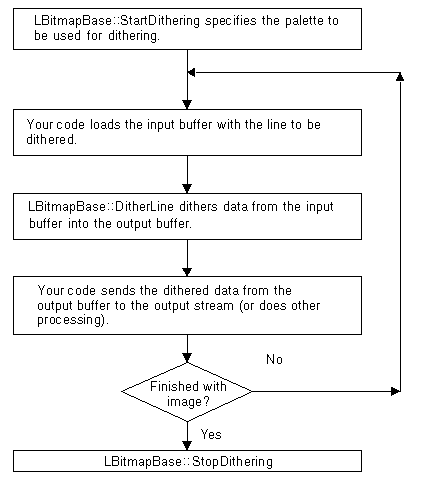LBitmapBase::StartDithering
Summary
Initializes the buffered dithering of a class object's bitmap. The dithering is then carried out by the LBitmapBase::DitherLine function and a callback function that you supply. It is ended by the LBitmapBase::StopDithering function. (Dithering is the process of using error diffusion to reduce the number of colors in an image.)
Syntax
#include "ltwrappr.h"
virtual L_INT LBitmapBase::StartDithering(pPalette, uColors)
Parameters
LPRGBQUAD pPalette
Pointer to the palette that the LBitmapBase::DitherLine function will use for dithering. You can specify your own palette, or use NULL for LEAD's fixed palette.
L_UINT uColors
Number of colors used in the palette. If the palette contains more colors, only the first uColors colors are used. Valid values are 2 to 255.
Returns
| Value | Meaning |
|---|---|
| SUCCESS | The function was successful. |
| < 1 | An error occurred. Refer to Return Codes. |
Comments
The following flow chart shows how the functions relate to each other:

Required DLLs and Libraries
- LTDIS
- LTFIL
- For a listing of the exact DLLs and Libraries needed, based on the toolkit version, refer to Files To Be Included With Your Application.
Platforms
Win32, x64.
See Also
Functions
Topics
- Raster Image Functions: Doing Color Expansion or Reduction
- Raster Image Functions: Doing Color Space Conversions
Example
This example dithers each line in one bitmap and writes it to another bitmap
L_INT LBitmapBase__StartDitheringExample(){L_INT nRet;LBitmapBase LeadBitmap, TmpBitmap; /* to hold the loaded image */LBuffer InBuf, OutBuf;RGBQUAD FixedPalette[256]; /* Fixed palette */int i; /* Loop counter *//* Load the input bitmap, at 24 bits per pixel */TmpBitmap.Load (MAKE_IMAGE_PATH(TEXT("ImageProcessingDemo\\Image3.cmp")), 24, ORDER_BGR);/* Create the new bitmap */LeadBitmap.Create(TmpBitmap.GetWidth(),TmpBitmap.GetHeight(),8, /* 8 bits per pixel */0, /* Color order is not used */NULL, /* Use the fixed palette */TmpBitmap.GetViewPerspective());/* Allocate the input buffer for 24-bit data */nRet =InBuf.Reallocate(TmpBitmap.GetBytesPerLine());if(nRet !=SUCCESS)return nRet;/* Allocate the output buffer for 8-bit data */nRet =OutBuf.Reallocate(TmpBitmap.GetBytesPerLine());if(nRet !=SUCCESS)return nRet;/* Get the LEAD fixed palette for an 8-bit image */nRet =TmpBitmap.GetFixedPalette(FixedPalette, 8);if(nRet !=SUCCESS)return nRet;/* Set the dithering method */TmpBitmap.SetDitheringMethod ( STEVENSON_ARCE_DITHERING);/* Initialize the dithering process */nRet =TmpBitmap.StartDithering(FixedPalette, 256);if(nRet !=SUCCESS)return nRet;/* Use DitherLine to process each row in the bitmap */nRet =LeadBitmap.Access();if(nRet !=SUCCESS)return nRet;nRet =TmpBitmap.Access();if(nRet !=SUCCESS)return nRet;for(i=0; i < TmpBitmap.GetHeight(); i++){nRet =(L_INT)TmpBitmap.GetRow(&InBuf, i);if(nRet < 1)return nRet;nRet =TmpBitmap.DitherLine(&InBuf, &OutBuf);if(nRet !=SUCCESS)return nRet;nRet = (L_INT)LeadBitmap.PutRow(OutBuf, i);if(nRet < 1)return nRet;}nRet =TmpBitmap.Release();if(nRet !=SUCCESS)return nRet;nRet =LeadBitmap.Release();if(nRet !=SUCCESS)return nRet;/* End the dithering process */nRet =TmpBitmap.StopDithering();if(nRet !=SUCCESS)return nRet;return SUCCESS;}
© 1991-2024 LEAD Technologies, Inc. All Rights Reserved.
